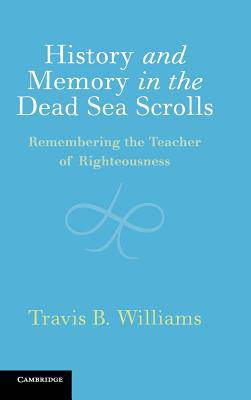
Door een staking bij bpost kan je online bestelling op dit moment iets langer onderweg zijn dan voorzien. Dringend iets nodig? Onze winkels ontvangen jou met open armen!
- Afhalen na 1 uur in een winkel met voorraad
- Gratis thuislevering in België vanaf € 30
- Ruim aanbod met 7 miljoen producten
Door een staking bij bpost kan je online bestelling op dit moment iets langer onderweg zijn dan voorzien. Dringend iets nodig? Onze winkels ontvangen jou met open armen!
- Afhalen na 1 uur in een winkel met voorraad
- Gratis thuislevering in België vanaf € 30
- Ruim aanbod met 7 miljoen producten
Zoeken
History and Memory in the Dead Sea Scrolls
Remembering the Teacher of Righteousness
Travis B Williams
Hardcover | Engels
€ 167,95
+ 335 punten
Omschrijving
The nature and reliability of the ancient sources are among the most important issues in the scholarship on the Dead Sea Scrolls. It is noteworthy, therefore, that scholars have grown increasingly skeptical about the value of these materials for reconstructing the life of the Teacher of Righteousness. Travis B. Williams' study is designed to address this new perspective and its implications for historical inquiry. He offers an important corrective to popular conceptions of history and memory by introducing memory theory as a means of informing historical investigation. Charting a new methodological course in Dead Sea Scrolls research, Williams reveals that properly representing the past requires an explanation of how the mnemonic evidence found in the relevant sources could have developed from a historical progression that began with the Teacher. His book represents the first attempt in Dead Sea Scrolls scholarship to integrate history and memory in a comprehensive way.
Specificaties
Betrokkenen
- Auteur(s):
- Uitgeverij:
Inhoud
- Aantal bladzijden:
- 458
- Taal:
- Engels
Eigenschappen
- Productcode (EAN):
- 9781108493338
- Verschijningsdatum:
- 27/06/2019
- Uitvoering:
- Hardcover
- Formaat:
- Genaaid
- Afmetingen:
- 152 mm x 229 mm
- Gewicht:
- 784 g

Alleen bij Standaard Boekhandel
+ 335 punten op je klantenkaart van Standaard Boekhandel
Beoordelingen
We publiceren alleen reviews die voldoen aan de voorwaarden voor reviews. Bekijk onze voorwaarden voor reviews.











